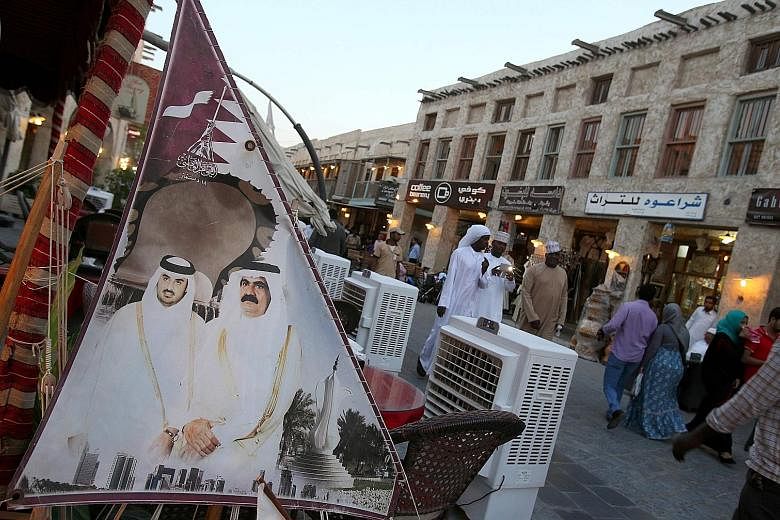When countries clash, the first to suffer are ordinary people. And so it is with the current showdown between Qatar and its Gulf neighbours. By tomorrow, a two-week deadline will expire, forcing most Gulf citizens who live and work in Qatar to leave, and expelling all Qatari citizens from the neighbouring nations.
Tens of thousands of families are being torn asunder, as people leave their jobs and properties behind, and as spouses and children in a region where cross-border marriages are the rule rather than exception bid their farewells, unsure whether their lives would ever return to normality.
But even if the dispute is patched up, the impact of the blockade which Saudi Arabia and Egypt, aided by their regional allies, have imposed on Qatar will have long-term consequences. For the confrontation has already destroyed decades of efforts to promote Gulf cooperation. It has also convulsed an already troubled Middle East. And it raises troubling questions about the obligations and rights of a small and inherently vulnerable state such as Qatar in today's global security system.
With little advance warning, Saudi Arabia and its closest allies decided earlier this month to blockade Qatar, in an effort to punish the tiny emirate of 2.7 million residents, out of whom only about 300,000 are Qatari citizens, for allegedly supporting the wrong groups - namely the Muslim Brotherhood which the Saudis and Egyptians see as their mortal enemies, and getting close to Iran, Saudi Arabia's regional bugbear.
Qatar's youthful Emir, Sheikh Tamim Hamad Al-Thani, has strongly denied these claims. But facts were never the key ingredient in this confrontation.
The animosity between Qatar and Saudi Arabia goes back to the early 1990s, when Doha started using its revenues to buy into chunks of the world's economy. Anything, from owning the London Shard - Europe's tallest skyscraper - to a national football club in France or a substantial stake in Germany's Volkswagen carmaker, not only to secure its wealth for future generations, but also to safeguard its place in the world. As Qatari officials often told me in private, being plugged into the world economy was actually part of a national survival strategy.
More spectacularly still, it set up Al Jazeera, a TV channel which gave Qatar huge "soft power" leverage.
There is no question that, in the process, the Qataris consorted with some unsavoury characters: The Muslim Brotherhood got infusions of Qatari cash at various times, and some leaders of other organisations classified as terrorists by most of the world's governments were, at one time or another, in Doha.
But it is equally true that most other Gulf states also forged, at various times, links with dubious people and organisations; what separates Qatar from the rest is that the Qataris have consistently been a challenger rather than upholder of the regional status quo.
This confrontation is led by a new generation of rulers like Saudi Deputy Crown Prince Mohammed Salman and Abu Dhabi's powerful Crown Prince Mohammed Zayed al-Nahyan. The concessions they demand from Qatar in return for lifting the blockade, which allegedly involve shutting down Al Jazeera, expelling Muslim Brotherhood leaders and a public undertaking not to support groups contrary to Saudi interests, are designed to humiliate the Qataris, once and for all.
In theory, there is no question who would emerge as winner: Qatar is dwarfed in every respect by its hostile neighbours. Yet having plenty of money does help: Qatar is able to circumvent the embargo and airlift fresh food from Iran, while ordinary Qataris have been reassured by promises from Turkey to station troops on Qatari soil.
But the reality remains that this is a dispute about who controls the future strategic narrative in the Gulf. The Saudis are unlikely to invade Qatar if only because they themselves are vulnerable to any action which undermines the credibility of local monarchies.
With its involvement in the Syrian war and facing a terrorist threat at home, the last thing Turkey needs is a military deployment to Qatar. Also, the Iranians are already up to their necks in proxy wars in Iraq, Syria and Lebanon. And finally, although Doha has made a great virtue of its ability to survive, it knows that, in the long term, there is no substitute to an accommodation with Riyadh.
Still, the long-term consequences are serious. The sight of a small, vulnerable island-state being pushed around by its neighbours spells nothing good about the current international legal system.
The Saudi case against Qatar does have its merits, but the way the Saudis are pursuing their objectives shatters the Gulf unity which everyone needs in order to pursue the fight against global terrorism. It is a tragedy that the only example of an effective regional structure in the region - the Gulf Cooperation Council - is now being dismantled.
It is also a tragedy for the Arab world that the two powers now calling the shots - Turkey and Iran - are both non-Arab; the dispute over Qatar does nothing to strengthen Arab solidarity.
And finally, the showdown is also a reminder of what happens when the United States abandons its traditional role as the region's pre-eminent actor and mediator: The result is not less, but more instability.
SEE OPINION A41


